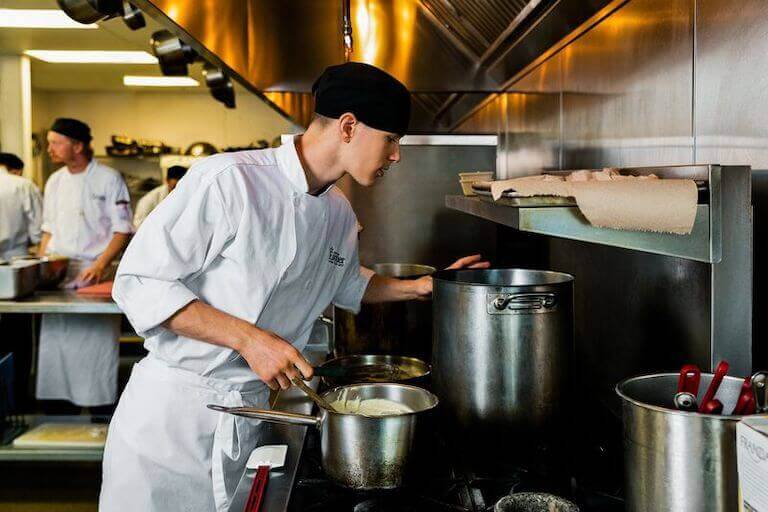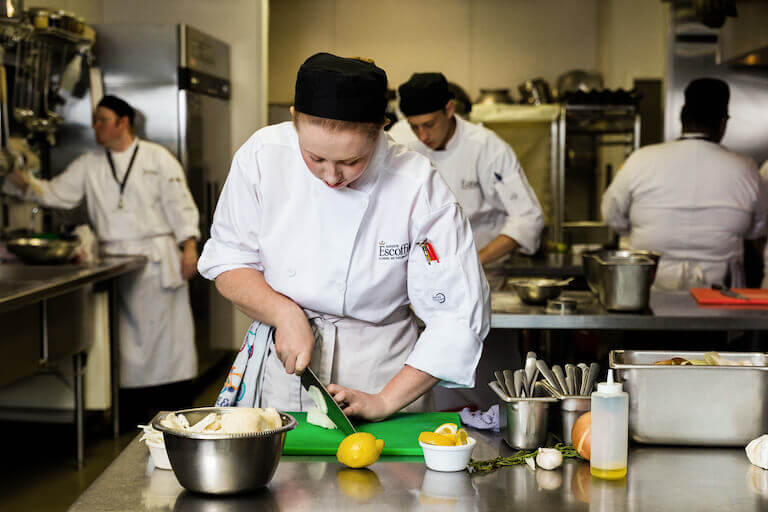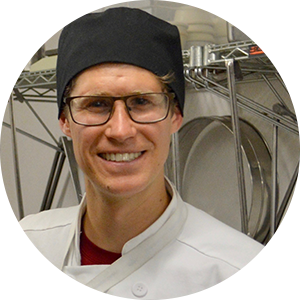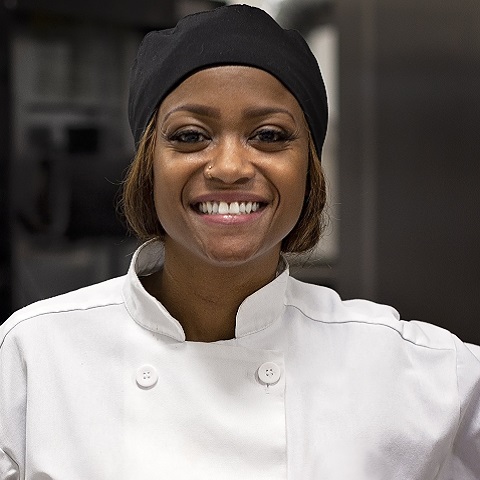Maybe you’ve heard the terms “trade school”, “technical school”, or “vocational school” in conversation, but couldn’t really define what they mean. If you’re considering culinary school, you might also be wondering whether it falls under these different umbrellas. And furthermore, you might be wondering how a culinary degree or diploma program compares to a traditional college education.
Let’s explore exactly what a trade school is, whether culinary school falls into this category, and whether it could be the right fit for you.
What Is The Difference Between a Trade School, Technical School, and Vocational School?
While these terms are often used to categorize different types of continuing education, their definitions aren’t set in stone and are sometimes used interchangeably.
- A vocational school is a broad term for any type of educational institution that prepares students for a specific job immediately following graduation.
- A trade school is one type of vocational school that focuses on more specialized hands-on training in a certain industry or skill, like auto mechanics, cosmetology, or medical imaging.
- Other types of vocational schools might include tech schools where you can earn certifications in technical fields such as engineering, finance, or information technology.
Is Culinary School a Trade School?
Yes, a culinary program is considered both a trade school and a vocational school because it can prepare students for a career in a specific trade—in this case, a distinct facet of the culinary world.
For example, Auguste Escoffier School of Culinary Arts offers degree and diploma programs in the culinary arts. We also have programs for people looking for pastry school, plant-based culinary school, as well as Food Entrepreneurship, and Holistic Nutrition & Wellness programs. For those looking for hospitality school, you can consider our Hospitality & Restaurant Operations Management program.

Escoffier Boulder student enrolled in the Culinary Arts program, exploring how to make vegetable stock.
Following graduation from high school, a traditional path of education might look like obtaining a college degree from a two-year or four-year college, then joining the workforce.
But many are becoming disillusioned with both the cost of traditional higher education and a potential lack of opportunity following graduation. This is where a trade school—like culinary school—comes in. So why might you consider such a path?
Trade Schools Are Typically Completed More Quickly Than College
Want to streamline your education journey?
Usually, degrees or diplomas from trade schools take less time to complete than a traditional four-year degree. For example, at Escoffier, programs can range from 30 to 84 weeks, depending on the type of program. This is particularly helpful for students who have family obligations or work a full-time job. It means a briefer period of attending school while meeting these other obligations.
“It took me 19 years to figure out what I wanted to do and Auguste Escoffier School of Culinary Arts made it easy and fun to achieve the goal!”*
Mary Weischedel, Escoffier Baking & Pastry Arts Graduate
Trade Schools Can Prepare Students for the Workforce with the Right Skillset
According to the National Student Clearinghouse Research Center, two-year college skilled trades program enrollment (specifically culinary) increased last spring by 12.7%—likely indicating that adults today might be looking for a more focused education and skill set.
If you’re interested in learning career-focused skills and entering a career path in a relatively short period of time, trade school could be the optimal route to take. Trade schools, like a culinary school, are skills-based, so they’re less focused on general knowledge that may or may not apply to the industry a student is seeking to enter. Whereas colleges and universities require a broad range of courses, trade schools hone in on one specific skill set.

Escoffier student practicing knife cuts, covered in a culinary fundamentals class.
Traditional education, like college, might also have more in the way of lecture and theory, whereas a trade school will involve more training on the practical application. For this reason, students emerge from a trade school with the practical knowledge needed to obtain an entry-level job in the field right away.
For example, in Escoffier’s programs, students have the opportunity to apply practical culinary skills which may be in demand by today’s employers, through the coursework and by completing one to two industry externships. Under the direction of a seasoned culinarian, students can refine their skill set “hands-on” in the kitchen—exploring firsthand, the fast-paced environment they’ll eventually work in, full-time. This is a prime opportunity to hone in on your interests, which can shape your future career goals. Also, it’s a chance to network with professionals, which could lead to future job opportunities!
Trade Schools May Offer More Mentorship Opportunities
There’s also the culture of the educational institution to bear in mind. For instance, at a trade school, you’re likely to interact often with your instructors, whereas at a university you may find it more difficult to meet your professor one-on-one. For those seeking mentorship and more guidance in their education or career path, this in itself could be a deciding factor.
“You have mentors in a restaurant setting, but you won’t get the variety. At Escoffier, you’re exposed to 10+ executive chefs, and you’re surrounded by them every day. There’s a wealth of mentorship at your fingertips.”*
Shane Witters Hicks, Escoffier Boulder Graduate & Private Chef/Educator, The Soulful Spread
Escoffier’s Chef Instructors can help their students achieve their creative potential. Students have the ability to bounce new ideas off of their Chef Instructors and seek guidance for their professional path from Career Services staff. With dedicated office hours and low instructor-to-student ratios on campus, you can have the opportunity to connect with your teachers and mentors.
Trade Schools Can Offer Invaluable Career Resources
In trade school, you’ll be surrounded by like-minded peers who are all pursuing the same (or similar) career paths as you, which could spark new business ideas and partnerships, post-graduation In four-year universities, your classes might be made up of students from a wide spectrum of disciplines, all majoring in something different.
And again, since trade schools are naturally more “concentrated” than a traditional university, often, trade schools will offer more focused and applicable career resources. For example, Escoffier students and alumni can access the Alumni Association—a professional network with 7,000 members that fosters peer-to-peer connection. Members get immediate access to an exclusive directory filled with expert profiles who can answer career-related questions, match with industry mentors, and tap into a job and externship database!
“It’s a really beautiful process that students go through. They can get support the whole way through, from the student Success Coaches, Career Service coaches, and then the Alumni Relations team. What we’re really trying to do is support students even after they leave.”*
Kay Larson, Alumni Relations Manager
Trade Schools Can Provide More Immersive Experiences
Often, when you attend a trade school, the staff and faculty will do their best to offer educational experiences that actually apply to your profession!
At Escoffier, students can access a truly immersive international study opportunity at the largest culinary mecca of the world—Paris, France. Through the partnership with École Ducasse’s French culinary institute, Escoffier students can study alongside world-renowned instructors while completing an 8-to-9-week certification program. Alternatively, applicants with an Escoffier diploma or Associate’s degree can earn an École Ducasse’s 3-year bachelor’s degree in as little as 2 years!
Just imagine learning how to assemble decadent French pastries and delicate cakes in the bustling city center of Paris, lined with bustling cafes and quaint wine bars. Getting to embark on an experience like this can truly make an impact on any aspiring culinarian—one you may not come across at a traditional university.
“There was never a dull moment. I didn’t know how to bake, I didn’t know how to cook, but in Escoffier I was able to learn all the skills.”*
Norainee Rivas, Escoffier Baking & Pastry Arts Graduate
Is Culinary School the Right Choice for You?
Now that you’ve gotten an idea of what sets trade school apart from traditional higher education, let’s talk about culinary school specifically. Perhaps you’ve been kicking around the idea for a while, and you just haven’t landed on your decision.If that’s the case, first ask yourself the following questions:
Are you passionate about food and searching for a career in the culinary field?
Whether it be managing a restaurant, being a sous chef in a kitchen, or opening your own pâtisserie, feeling the call to the culinary world is a good indicator that you should consider an industry-related education.
The kitchen is a high-energy environment and can be a very rewarding career path if you love to create, serve others, and work with a team.
What type of culinary education are you looking for?
Maybe you’re just getting started on a path to a culinary career. Perhaps you’ve been working in the industry for some time, and you’re looking for a way to stand out. Or maybe you’re looking for a new creative outlet and skillset.
Take Escoffier graduate Chris Marhevka for example. With a master’s degree in social work and practicing in his field, he began to feel the onset of burnout during the COVID-19 pandemic. He had the desire to pursue something a bit more creative, which led him to enroll at Escoffier.
“I still love social work,” he says, “but I knew that I needed to switch up my life somehow and bring a little more balance into my life, a little more levity.”*
After graduating from Escoffier, Chris applied his skills to start his own food blog Cook Until Brown, while still practicing as a social worker. His long-term goal is to secure a profession in food media and create opportunities for other voices to be heard in the culinary industry.
A culinary degree or diploma can also give your resume a significant boost and help you market yourself and your skills. Escoffier students can dive into foundational culinary topics like menu design, nutrition, global cuisines, and food service math and accounting—practical knowledge that many employers value.
Are you willing to be more hands-on with your classes?
Culinary school can include written and verbal assignments and some lectures. But the majority of a culinary curriculum is about actually practicing what you’re learning from Chef Instructors, showcasing your skills and your comprehension of the material through tangible products.
Finally, do you have other responsibilities to take care of, like working a job, taking care of family members, or serving in the military?
Some culinary schools, including Escoffier, offer a flexible enough format for you to do both —but others don’t, so it’s important to talk to the school’s admissions department to get the scoop. Adult learners who are balancing careers or family obligations have found Escoffier’s weekly commitment to be manageable, especially through the online program format. Approximately 15-23 hours per week are spent on school-related activities depending on program, credential, and personal pace.
Escoffier’s Boulder campus (including the online programs) is also a designated 2023-2024 Military Friendly® School, meaning that we’ve demonstrated the highest levels of satisfaction in helping veterans transition from military life to school and civilian careers. We work with the Department of Veteran Affairs and all branches of the military to help administer any education assistance provided to veteran/active military students and/or their families.
“Anybody can say they are a chef. As far as the management portion, that is where Escoffier is really helping me actually run a restaurant, run a café, or run a business. And that’s what I want. I want my own restaurant.”*
Tiffany Moore, Co-Founder/Chef, Event Hall @ Cascade, TBS “Rat In The Kitchen” Contestant, Online Culinary Arts Graduate, Military Veteran
Evaluate Your Culinary Education Options
The bottom line is that trade schools aren’t for everyone. But when it comes to the culinary world, a degree or diploma from an accredited institution can be increasingly crucial for success.
If you’re thinking about culinary school, explore Escoffier’s options to see if anything piques your interest. We have two campuses—in Boulder, CO, and Austin, TX—as well as an online campus curriculum. Besides having access to 120+ expert Chef Instructors, you’ll complete an industry externship that can further help prepare you for the field.
Getting a meaningful start on your culinary career journey can start with pursuing the right type of education. Our admissions staff can help talk you through whether that education indeed starts with Escoffier.
Want to know more about culinary school? Browse these articles next:
- How You Can Get into Culinary School
- Why Study at a French Culinary Institute?
- 5 Tips for Building a Supportive Network in Culinary School
This article was originally published on November 15, 2021, and has since been updated.
*Information may not reflect every student’s experience. Results and outcomes may be based on several factors, such as geographical region or previous experience.

 “It took me 19 years to figure out what I wanted to do and Auguste Escoffier School of Culinary Arts made it easy and fun to achieve the goal!”*
“It took me 19 years to figure out what I wanted to do and Auguste Escoffier School of Culinary Arts made it easy and fun to achieve the goal!”* “You have mentors in a restaurant setting, but you won’t get the variety. At Escoffier, you’re exposed to 10+ executive chefs, and you’re surrounded by them every day. There’s a wealth of mentorship at your fingertips.”*
“You have mentors in a restaurant setting, but you won’t get the variety. At Escoffier, you’re exposed to 10+ executive chefs, and you’re surrounded by them every day. There’s a wealth of mentorship at your fingertips.”* “Anybody can say they are a chef. As far as the management portion, that is where Escoffier is really helping me actually run a restaurant, run a café, or run a business. And that’s what I want. I want my own restaurant.”*
“Anybody can say they are a chef. As far as the management portion, that is where Escoffier is really helping me actually run a restaurant, run a café, or run a business. And that’s what I want. I want my own restaurant.”*